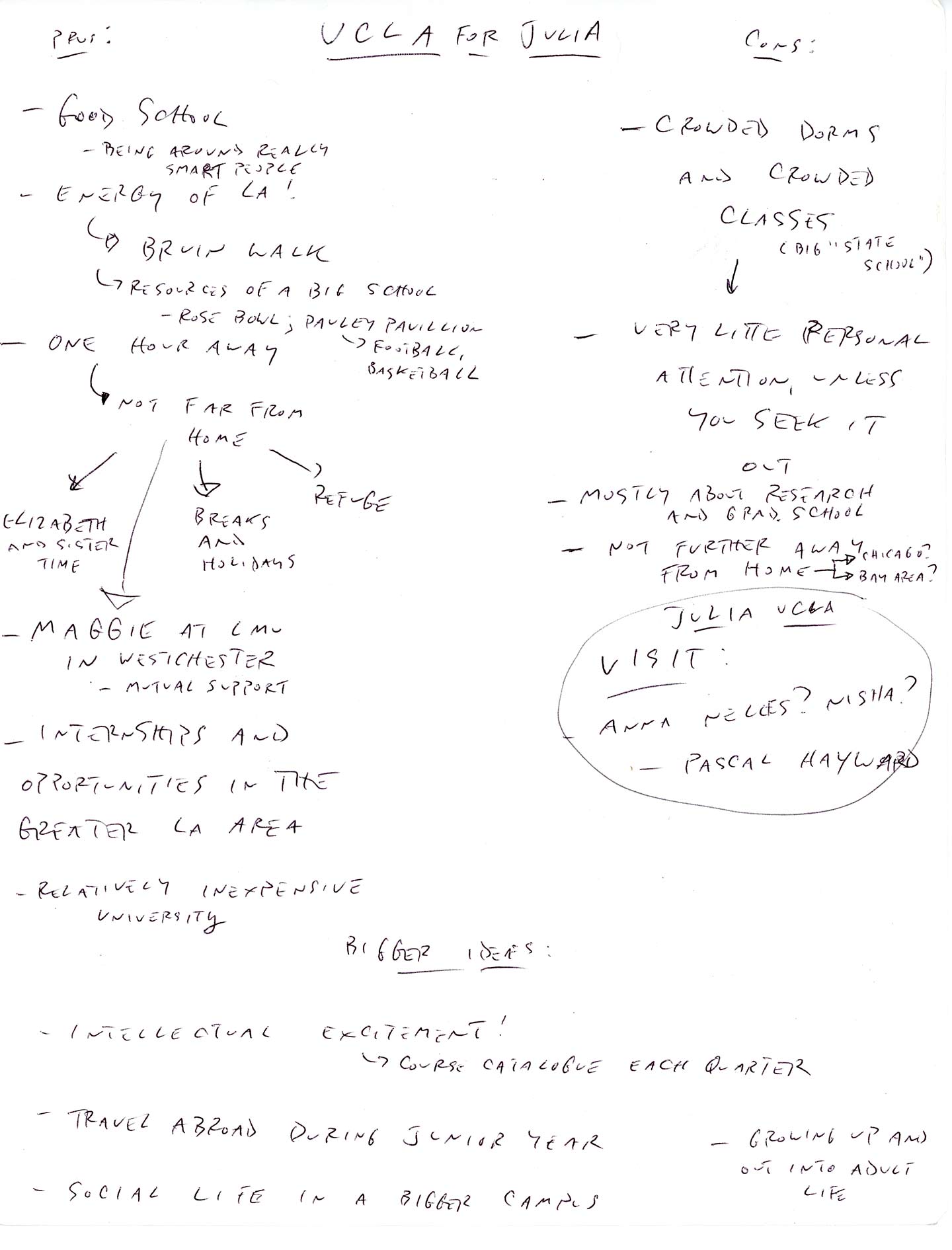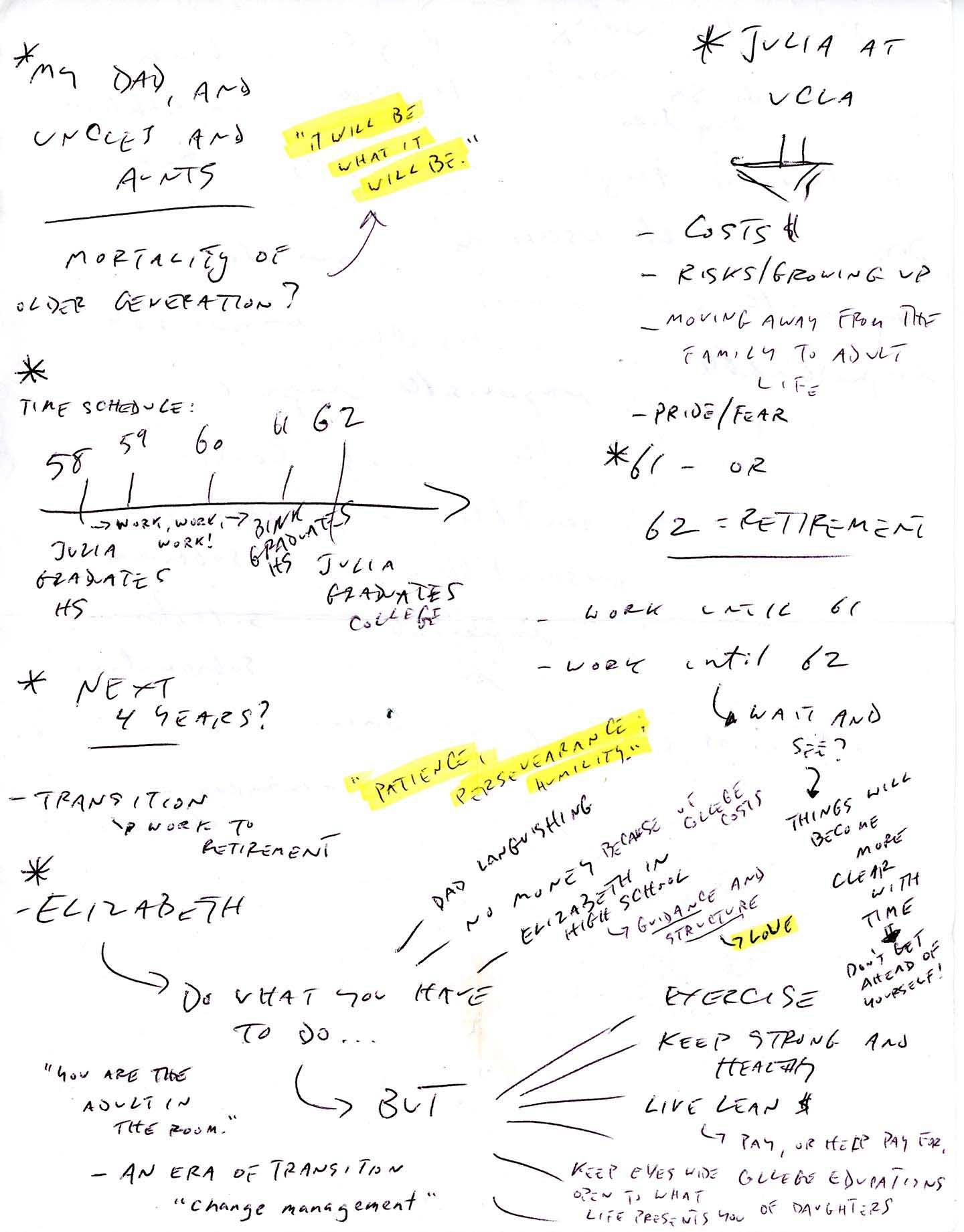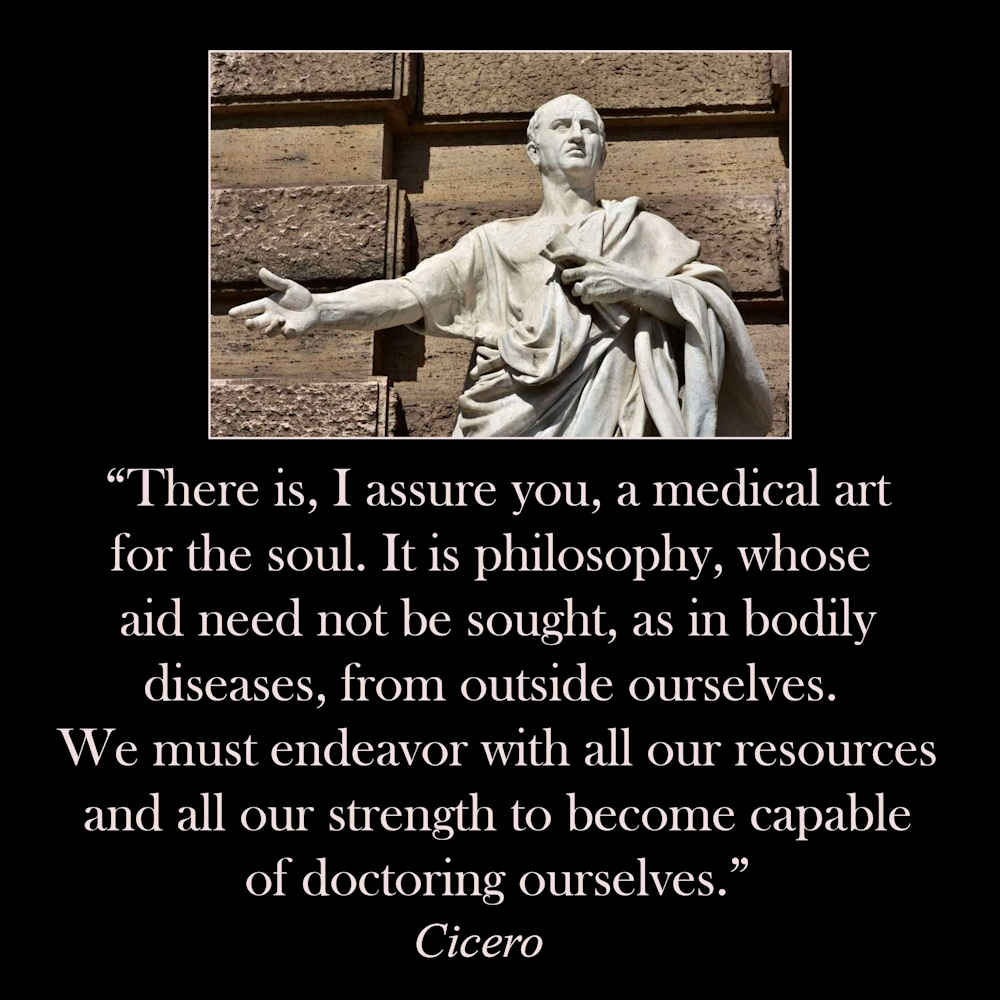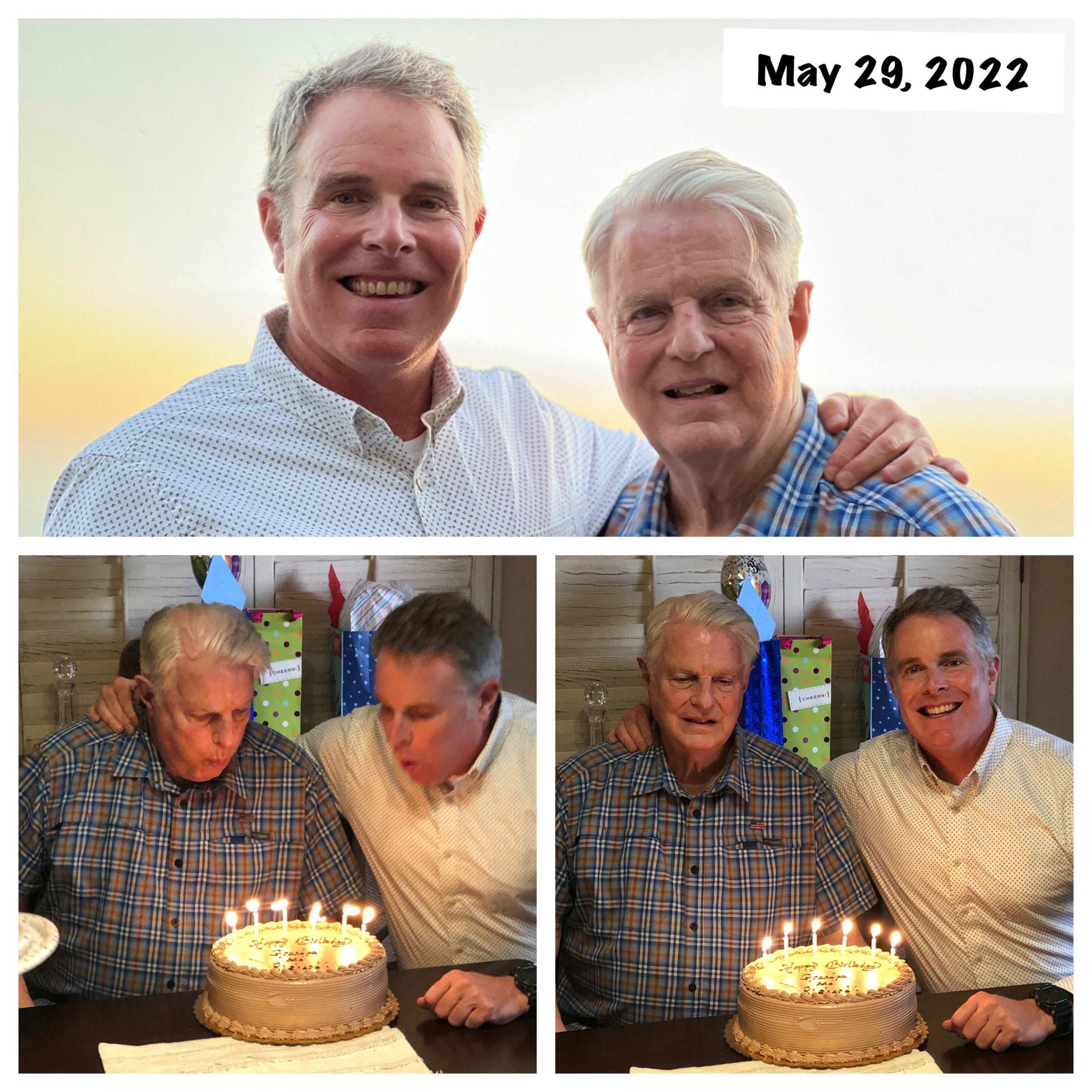Indecision.
A time of transition.
Change:
The process of leaving one situation and entering another.
The world might look like one thing at the end of it. Or it might be totally the opposite. You might arrive at place x. Or at place y.
It can be stressful. You arrive at a turning point where the status quo changes, and it could go one way or another; your mind is tempted to run wild in contemplating the possibilities. The “fight or flight” reaction of your ancient lizard brain designed to survive threats takes over. Chemicals are released into the bloodstream. The heart rate accelerates. Your mind focuses on what is the response necessary for survival. Anxiety increases. Ease and comfort become hard to find. You don’t want to make the wrong choice. But which are the right choices and the wrong ones remains unclear. You go in circles weighing the alternatives. Steam comes out of your ears from all the intense processing taking place.
This is taking place with my oldest daughter right now. She is preparing to graduate and leave her high school. She is mulling over whether to attend UCLA next year. Such a huge life decision should be made in the sober light of day, carefully considering the merits of the possible choice. To try and help her, I made a list of what I thought might be the pros and cons of attending UCLA:

Next weekend I will sit down with her and talk over whether UCLA is the right choice for her. I attended UCLA, as did my wife; I know a lot about the place, and I can help her with her decision. It is almost like fate that my daughter would attend UCLA. She cried with happiness when she learned that she was one 13,114 out of 146,276 applicants who were accepted to the Class of 2029 there. Quite an honor! But with so much of her family having gone to UCLA, it was almost as if she were born and bred to be a Bruin. (On the other hand, I was undogmatic about this. I would have been happy to see her attend some other prestigious university.) The future appears auspicious for my oldest daughter: she is well advanced on the path towards life success. She is almost launched into adult life. It is happening.

Yet I cannot but wonder what will happen to her over the next few years. I am excited for her, but at the same time I worry. Maybe it is just because fathers worry – that is what they do. “He that hath wife and children hath given hostages to fortune,” quoteth Sir Francis Bacon. Yet I knew that my daughter’s college application journey will most likely end in success. Year after year I make this little speech to my high school seniors:
“College is where you move out of your childhood home and into a dorm with other freshmen. College is where you fall in and then out of love. College is where you make a hash of things and learn. It is where you take your first baby steps in adult life. It is where you grow up. It will be ok.”
But it is one thing for me to tell high school seniors that they might get their hearts broken in college. It is another thing for me as a father to contemplate some young man breaking my beloved daughter’s heart. My blood pressure rises when I think about it. And a bad breakup is far from the worst thing that could happen to her. In fact, it is almost to be expected – a part of life, especially for the young. But then I remember that the vast majority of problems I stress about which could befall me or my family don’t actually happen. My daughters haven’t been kidnapped or developed schizophrenia, at least not yet. My wife has not developed cancer. I haven’t been hit by a drunk driver, not yet. The odds are that tragedies like those will never befall us, God willing.
The same goes with applying to college. Last year I warned my oldest daughter not to fall into that dark vortex of stress and frustration over college applications during her senior year. Here is the speech I have given to my students for decades, born out of long experience watching the process with my own eyes:
“You will get rejected from some colleges, and that can be bruising to the ego. But you will also get accepted into other ones. You will arrive at a university next year which is the right fit for you. You will have the opportunity to be happy and successful. It will all turn out alright. Do your research, apply in good faith, and trust the process.”
I gave my daughter and myself the same advice about college and not getting sucked into that black hole of worry and anxiety. With patience, perseverance, discipline, and a little luck… it will all turn out fine. My daughter would land her dream school. Work hard, be honest, love liberally, and trust in the future. “It will be what it will be.” Past a certain point fear and anxiety about possible futures are wasted energy which could be better used to work and thrive in the present. I realized this with my rational brain, but my emotions at times could have a life of their own. I worry, as fathers are wont to do. But Henry Ward Beecher reminds us of the following:
“It is not work that kills men; it is worry. Work is healthy; you can hardly put more upon a man than he can bear. Worry is the rust upon the blade. It is not the revolution which destroys the machinery but the friction. Fear secretes acids; but love and trust are sweet juices.”
That is well said.
I could use similar reasoning when related to my own life. I have a few years left before I retire from my career; I have been a classroom teacher for going on thirty years, and suddenly I will be something very different. I am incredibly excited at the prospect, and also a bit concerned at what will be a big change. Retirement is a relief. I will be lucky to enjoy it, but it will also be an adjustment and a challenge. I recognize this. I have read that the first year of retirement is often the hardest. Many never really adjust to the changed reality of fending for oneself free of structure; some return to the workforce and the stability of the known 9-5 life of employment. Change is hard. Multibillion dollar businesses dedicate enormous resources to negotiating “change management” for their complex organizations; they recognize that managing change is that important and warrants becoming a priority, as even when change is welcome and overdue it can bring stress and difficulty. I would endeavor to give the same close inspection to change in my own life. But it is not only the prospect of retirement. My father is also growing weaker and more debilitated. I contemplated my siblings and I becoming an orphan and that is concerning to me. “Will my father’s end by ugly and prolonged? Or short and unexpected? Painful? Or not?” Nobody has an answer to those questions. Although anyone with eyes to see can predict he will not be around several years hence. To pretend otherwise is foolish. Why lie to oneself?
I move on from there: What will I do with my precious time and energy in my 60s? What will my daughters eventually do for a living and where will they live? What will my finances look like in retirement? Will I have enough to live comfortably? What will my own health look like as I approach old age? What blows might arrive I won’t even see coming? Will the phone ring in the middle of the night with tragic terrible news? It would not be the first time. One learns to dread that phone call which delivers life changing, unexpected bad news. “I’m sorry to inform you that…” Will I have the misfortune to receive more such phone calls? (For sure.) I live a bit in a perpetual low-level fear of the next such call. When will it arrive? What will have happened? What will they say?
These are all weighty questions. I can discern the outlines of what my future looks like today without knowing exactly what it will look like tomorrow. I strain to see what my life will be in five or ten years. How could I not? Enormous change is coming my way, no doubt. Even positive and necessary change can be difficult, however, as I already explained. One must manage the change, rather than be managed by it. I know this.
So last week was my spring break – one week of vacation. I had a skin tag cut off my left eyelid during that time, and endured a colonoscopy as well. But I also took significant time out to contemplate my anxieties about the next few years – the subject of this essay. I sat down and thought it through at length. Using short-hand Cognitive Behavioral Therapy, I made this diagram to sketch out realistically the concerns I have and how I should feel about them:

And after spending several hours over several days mulling it all over, I felt better. I experience less anxiety in contemplating the immediate future. I could see how the landscape would probably look, and I was ready to travel over it. I tried to keep in mind the big picture of what was happening in my life.
In particular, I look at the numbers with respect to retiring. I had long hoped to retire at 61-years of age.
Next year will be my 26th in the same classroom in the same school (and 29th teaching overall), and I am ready for something different. But the money is better if I retire at 62. And I will have a daughter in that year of 2028 who will be a college senior and another who will be a freshman; that will be expensive. If I stay one more year on the job, until I am 62, I can help pay their university tuition and gain more money per month in my pension. The people who make those pensions design them to fully vest in the last few years, so as to keep employees as long as they can. They are not dumb. But working that last year or two can be hard after already spending almost three decades there. I sometimes joke that so many decades occupying the same 80’ by 50’ physical space is akin to a jail sentence. “25 years to life in Room G108!” But it is not for life. The time will be just shy of three decades. 29 years teaching in the same exact classroom. In June of 2029 it will end. Probably. That is just over four years from now. Then I will have a solid pension for the rest of my life.
I do not hate my job. I have grown to almost disbelieve in the public school system as I work in it – the education bureaucrats and idiotic rules and teacher unions and school boards and whatnot. But I love teaching in my classroom with students as much as I did back in 1993 when I started. In fact, I love teaching a fair amount more now because I am better at it. I love the history I teach. I love to talk about good writing and encourage it. The humanities are my life, inside the classroom and out. I wake up contemplating teaching Mao’s “Great Cultural Revolution” or the trial of King Louis and Marie Antoinette that day, and I spring out of bed eager to get at it. If my contemplation of the actual reality of California public school governance could hardly be more cynical by this point, my job in the actual spending time with students learning fascinating concepts is almost as pure and innocent as it was twenty-nine years ago. Who else gets paid to teach “Romeo and Juliet” to teenagers? What a gift!
So I try to remember to put all my frustrations with “the system” in a metaphorical box which I keep in some remote corner of my classroom, and to not let it take too much of my daily time and energy. My students don’t care about the idiocy of some assistant superintendent or the inanity of a school board policy; they just want the best classroom instruction I can give. I am sure I had similar veteran teachers back when I was a student who were fed up in a similar way. I am glad they just focused on giving me whatever knowledge and skills they could give when they could give it. I didn’t care about the politics of the school. I realized they were probably pretty stupid. As a high schooler I wanted to get the best education I could before I got to college. I mostly received that. I’m sure that often took place despite “the system,” not because of it. As a longtime teacher, I try to remember to keep this in mind. Thinking in this manner helps me withstand yet another year in my classroom.
And so I have also come to appreciate this fact: whether I teach one year more or less will not make much of a difference in the big picture. Getting super anxious about retiring at 62 instead of 61 is a bit ridiculous. (“Ahhh! One more year!”) In the long view of things, it will be over soon enough. It will be ok. When push comes to shove with respect to retirement, I can make the necessary decisions when the time arrives (and that time is not now). Either way I will be a relatively young man when I retire. Similarly, my father will endure his decline and demise one way or another, and I am not in control of the process. All I can do is be as loving and supportive a son as I can. “Thy will be done!” Furthermore, my daughters will move away from the family home and encounter the joys and pains which adult life confers. “It will be what it will be.” Relax and enjoy, Richard. You are not in control, not really. Do what you can to help and then allow it to happen. It moves onward from there: my health and happiness as I enter my seventh, eighth, and ninth decade of life will be what my life will be like. What will happen to me? How can I not think about it and worry? But then I remember: Don’t fret, Richard. It will be ok. “Worry is rust upon the blade.”
Having thought it through at length last week, I feel considerably better this week than before. If a person lets their concerns and worries off the tether, it can result in painful “hot thoughts” run amok. This can lessen the quality of your life. You will be like a kitten chasing her own tail. Frantic, neurotic.
But if you think through your situation clearly, you can more rationally and accurately understand how things stand. This should result in a greater sense of equanimity and peace. As Cicero explained in this ability to control your mood and bring about improvement through thinking clearly and holding the proper attitude:






